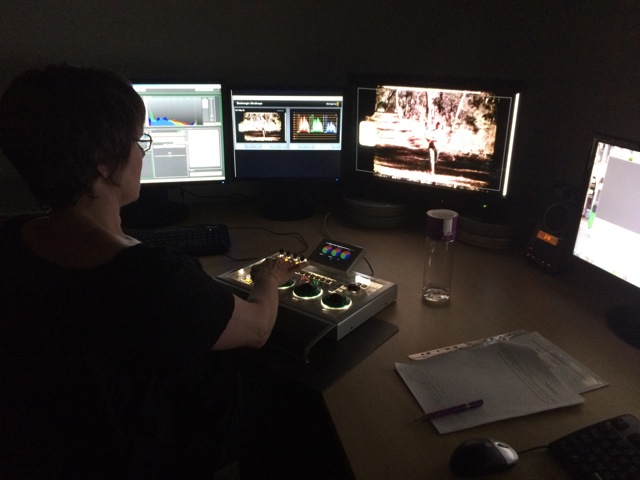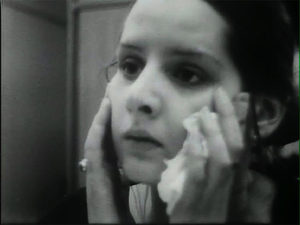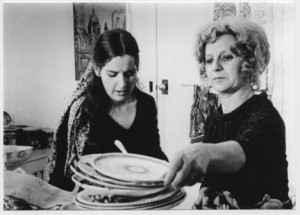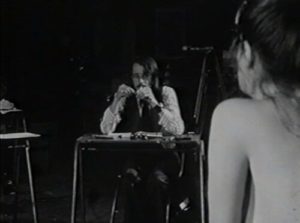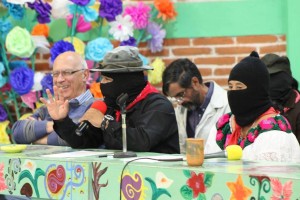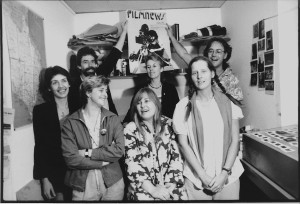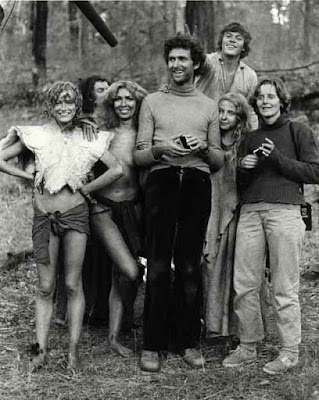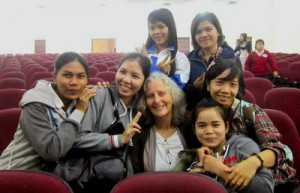‘Contested Histories: The Documentaries of Jeni Thornley’, Retrospective Melbourne Cinematheque, ACMI Wed October 30 2024.
Published alongside the Retrospective are the CTEQ Annotations on Film, Senses of Cinema, October 2024: Memory Film (2023) by Janice Loreck, Island Home Country (2008) by Sian Mitchell, Maidens (1978) by Jeni Thornley and Film For Discussion (1973) by Jeni Thornley (dir: Martha Ansara and Sydney Women’s Film Group); Thornley performs the main character.
Memory Film: a filmmakers diary is screening at various Film Festivals and venues across Australia. For further details see Memory Film.
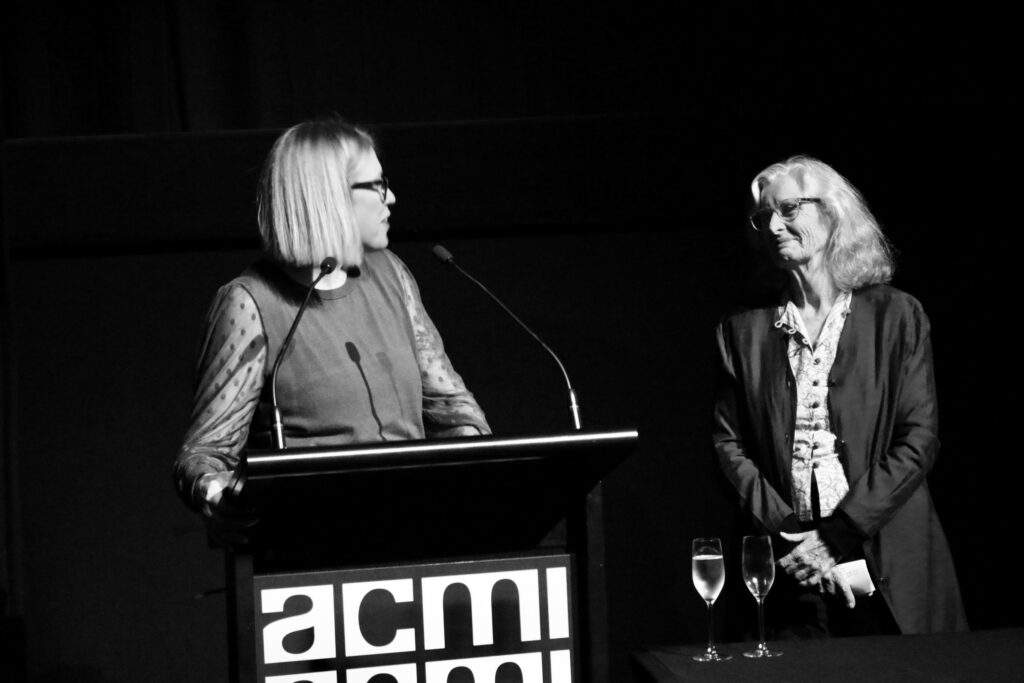
Sian Mitchell (MWFF Director) and Jeni Thornley, Melbourne Women in Film Festival ACMI March 2024
And check out Memory Film on the Documentary Australia site to make a donation towards our distribution fund raising.
CURRENT WRITING (scroll down for full listing)
Book chapter: Jeni Thornley, ‘The enigma of film: memory film: a filmmaker’s diary‘, Constructions of The Real: Intersections of Practice and Theory in Documentary-Based Filmmaking, (eds.) K. Munro et al., Intellect Books Series: Artwork Scholarship: International Perspectives in Education, 2023.
Book chapter: ‘“We are not dead”: Decolonizing the Frame’ – First Australians, The Tall Man, Coniston, First Contact (ed.) E. Blackmore et al., The Routledge Handbook of Indigenous Film. Routledge, 2024.
SCREENINGS/PANELS/CONFERENCES
2024 ‘Contested Histories: The Documentaries of Jeni Thornley’ Retrospective Melbourne Cinematheque, ACMI Wed October 30 2024
2024 Visible Evidence Conference XXX, Monash University, 17-20 Dec
2023 Conversations & Connections Documentary Festival, Storytelling on the Ground, CDCR Macquarie Uni, SLNSW, Dec.
2021 For Love or Money, Australian Women Filmmakers Program, 23rd Seoul International Women’s Film Festival, 28th & 30th August, South Korea. Also see their short essay, Australian Women Filmmakers
2021 Co- Panelist, ‘Australian Autofiction: A Filmmaker Roundtable by Chris Luscri’, Australian AutoFiction Special Dossier, Senses of Cinema, Issue 99.
2020 Co-Panelist, Catherine Dwyer in conversation with Margot Nash, Jeni Thornley, Megan McMurchy & Martha Ansara, Women Filmmakers, ACMI, Melbourne, Dec 18th. 2023 Conversations & Connections Documentary Festival, Storytelling on the Ground, CDCR Macquarie Uni, SLNSW Dec 2023
2021 Brazen Hussies (dir Catherine Dwyer): cinema release, festivals and ABC screenings. Brazen Hussies is a documentary feature about the revolutionary chapter of the Women’s Liberation Movement (1965 -1975); I am one of many activists interviewed for the film; I discuss my involvement in an Anti-Vietnam War street theatre group, the 1970s abortion rights campaign and other women’s liberation activities. My discussion of an illegal abortion I had in 1968, when abortion was a criminal act, stirred up a lot of complex emotions; perhaps necessary – indicating that it is still a disturbing site for me and many women- see my post The river of souls:
mizuko kuyō (水子供養) water child memorial .
Feminism & Film: Sydney Women Filmmakers, 1970s & 1980s Sydney Film Festival 2017. Three Retrospective programs including ‘Film For Discussion’ (1974) Sydney Women’s Film Group, (dir) Martha Ansara; and the 1983 collaborative feature documentary ‘For Love Or Money: A History of Women And Work in Australia’ .
Melbourne Women in Film Festival 2017 (MWFF) screened Still Life (1974 dir: Ross & Thornley). Emily Burkhard reviewed Still Life as “raw and evocative” in online mag ‘Mojo News‘ , along with a discussion of the contemporary films screened: Clare Ferra’s ‘Progressive Evolution; (2011) and ‘Love Oscillation’ (2012), and Amie Batalibasi’s ‘Lit’ (2016). My essay on Still Life, ‘Looking at Women’ was published in Peephole Journal, 7.
“The festival stood out for its series of informative and insightful panel discussions during the two-day inaugural showcase – on the role of women in screen culture, how this has evolved from the days of the 1975 International Women’s Film Festival.”
Public screening and discussion: Island Home Country (52 min). Monday 14th March 2017, Mona Vale. Aboriginal Support Group – Manly Warringah Pittwater (ASG).
Public screening and discussion: Island Home Country (52 min. film & thesis, DCA UTS 2011), Screening Indigeneity Series, Menzies Centre for Australian Studies & the Department of Film Studies, King’s College London, September 15th 2015.
For Love or Money, (dir. McMurchy, Nash, Oliver, Thornley), 2nd International Women’s Film Festival Bangladesh, Seminar Hall, Central Public Library, Dhaka, 16th March 2015.
Curator & Panelist, ‘Women’s Gaze and the Feminist Film Archive’, Future Feminist Archive, Art Gallery of NSW and Sydney College 2015.
Delegate, Critical Thought Versus The Capitalist Hydra, CIDECI, Universidad de la Tierra Chiapas, Mexico, May 2015
Maidens (dir. Thornley 1978), Retrospective Screening, Films from the Co-ops Part 1, Melbourne Cinémathèque, ACMI Cinemas, Federation Square, Melbourne, May 20 2015.
Referee reader for monograph, Robots and Art: Exploring an Unlikely Symbiosis (eds.), D. Herath, C. Kroos & Stelarc, Springer 2015.
Interviewee: In New Zealand, the Activist Complex Female Protagonist Whispers, (Marian Evans). Research Report on the New Zealand Film Commission’s Gender Policy, 2015
Interviewee, When the Camera Stopped Rolling (dir. Jane Castle). A documentary feature film about Lilias Fraser, pioneer of the Australian documentary film industry. Screen Australia and Documentary Australia Foundation (DAF), 2016
Interviewee, A Filmmakers’ Cinema: 20 Years of the Filmmakers’ Co-operatives (dir. John Hughes & Tom Zubrycki), a documentary film-archival project, 2016.
Interviewee (audio), Genealogy of thought-practice: sexual difference (Dir.Alex Martinis Roe), an arts based documentary film, 2016.
Member Filmnews Digitising Collective: a project to digitise the collection of Filmnews via the National Library of Australia’s Australian Newspapers Digitisation Program. Finance raised from various sources, including Australian Directors Guild (ADG) 2016.
The original Film News Collective c1980

